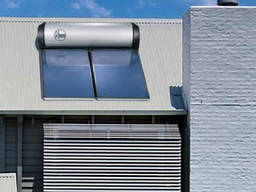Installing a new hot water system
Here we’ve described each type of hot water system and storage options.
Contact an appliance repair and installation company to discuss installing your new system.

Solar
Over the past few years you have likely seen advertisements and incentives to switch to solar power. It is both environmentally friendly and cost effective. The main cost associated with solar is the installation, which can be quite expensive. However there are rebates available to alleviate this burden and make solar more appealing. Solar can also be used in conjunction with electric or gas systems if needed, and often has an electric or gas element in the tank to provide power should the solar panels fail to do so. Not only will the rebates help to lessen the cost, a solar powered hot water system will likely pay for itself long term.
Electric
An electric hot water system works like an electric kettle to heat your water, and then keeps it at a high temperature throughout the day. Electric hot water systems are appealing because of their low price, but they can be inefficient and expensive to run. You can save money by heating your water during “off peak” times, but make sure you don’t run out! If you can’t part with an electric hot water system, consider installing solar panels, which can drastically reduce the cost of heating your water. Plus, there’s generous rebates available for installing solar power.
Heat pump
A heat pump is another type of electric hot water system, but more efficient. It works more like an air conditioner than a kettle, drawing heat from the air. They are normally placed outdoors, and like an air conditioner can be quite noisy. While they work best in warm climates, it’s surprising to know that they also work well in cold climates. Like solar powered hot water systems, a heat pump often has an electric or gas element to give a boost of power if needed.
Gas
Gas hot water systems work in the same way as electric, only with a gas flame heating the water. If you have access to gas at your house, this hot water system might be for you. It’s often cheaper than electricity, and you won’t have to worry about heating your water off peak, as there are no varied prices for gas. A gas hot water system will have to be installed outdoors, unless you want to put a flue inside to vent the gas. Consider which type of gas you will need to run it, as pre-bottled gas and natural gas can be different prices.
Instantaneous heating or storage tank
Most hot water systems use a storage tank in which they heat up water and keep it hot until it is used. This is particularly important in “off peak” hot water systems, which heat up the water during cheaper times and keep it hot for later use. However, continuous flow hot water systems heat the water as required, eliminating the need to store it in a tank. This is appealing if you don’t like the idea of you hot water sitting around in a tank that is corroding. It can also be less expensive if you heat your water during peak times, as they are often gas powered.
Quick Links
- Hot Water System Contractors & Services in Australia
- Hot Water System Contractors & Services in Adelaide
- Hot Water System Contractors & Services in Brisbane
- Hot Water System Contractors & Services in Inner North
- Hot Water System Contractors & Services in Hobart & South East
- Hot Water System Contractors & Services in Melbourne
- Hot Water System Contractors & Services in Darwin
- Hot Water System Contractors & Services in Sydney
- Hot Water System Contractors & Services in Perth

